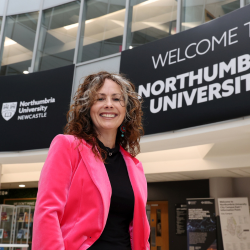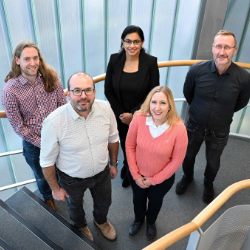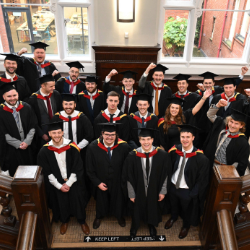-
Study
-
Quick Links
- Open Days & Events
- Real-World Learning
- Unlock Your Potential
- Tuition Fees, Funding & Scholarships
- Real World Learning
-
Undergraduate
- Application Guides
- UCAS Exhibitions
- Extended Degrees
- School & College Outreach
- Information for Parents
-
Postgraduate
- Application Guide
- Postgraduate Research Degrees
- Flexible Learning
- Change Direction
- Register your Interest
-
Student Life
- Students' Union
- The Hub - Student Blog
- Accommodation
- Northumbria Sport
- Support for Students
-
Learning Experience
- Real-World Learning
- Research-enriched learning
- Graduate Futures
- The Business Clinic
- Study Abroad
-
-
International
International
Northumbria’s global footprint touches every continent across the world, through our global partnerships across 17 institutions in 10 countries, to our 277,000 strong alumni community and 150 recruitment partners – we prepare our students for the challenges of tomorrow. Discover more about how to join Northumbria’s global family or our partnerships.
View our Global Footprint-
Quick Links
- Course Search
- Undergraduate Study
- Postgraduate Study
- Information for Parents
- London Campus
- Northumbria Pathway
- Cost of Living
- Sign up for Information
-
International Students
- Information for International Students
- Northumbria and your Country
- International Events
- Application Guide
- Entry Requirements and Education Country Agents
- Global Offices
- English Requirements
- English Language Centre
- International student support
- Cost of Living
-
International Fees and Funding
- International Undergraduate Fees
- International Undergraduate Funding
- International Masters Fees
- International Masters Funding
- International Postgraduate Research Fees
- International Postgraduate Research Funding
- Useful Financial Information
-
International Partners
- Agent and Representatives Network
- Global Partnerships
- Global Community
-
International Mobility
- Study Abroad
- Information for Incoming Exchange Students
-
-
Business
Business
The world is changing faster than ever before. The future is there to be won by organisations who find ways to turn today's possibilities into tomorrows competitive edge. In a connected world, collaboration can be the key to success.
More on our Business Services-
Business Quick Links
- Contact Us
- Business Events
- Research and Consultancy
- Education and Training
- Workforce Development Courses
- Join our mailing list
-
Education and Training
- Higher and Degree Apprenticeships
- Continuing Professional Development
- Apprenticeship Fees & Funding
- Apprenticeship FAQs
- How to Develop an Apprentice
- Apprenticeship Vacancies
- Enquire Now
-
Research and Consultancy
- Space
- Energy
- AI and Tech
- CHASE: Centre for Health and Social Equity
- NESST
-
-
Research
Research
Northumbria is a research-rich, business-focused, professional university with a global reputation for academic quality. We conduct ground-breaking research that is responsive to the science & technology, health & well being, economic and social and arts & cultural needs for the communities
Discover more about our Research-
Quick Links
- Research Peaks of Excellence
- Academic Departments
- Research Staff
- Postgraduate Research Studentships
- Research Events
-
Research at Northumbria
- Interdisciplinary Research Themes
- Research Impact
- REF
- Partners and Collaborators
-
Support for Researchers
- Research and Innovation Services Staff
- Researcher Development and Training
- Ethics, Integrity, and Trusted Research
- University Library
- Vice Chancellors Fellows
-
Research Degrees
- Postgraduate Research Overview
- Doctoral Training Partnerships and Centres
- Academic Departments
-
Research Culture
- Research Culture
- Research Culture Action Plan
- Concordats and Commitments
-
-
About Us
-
About Northumbria
- Our Strategy
- Our Staff
- Our Schools
- Place and Partnerships
- Leadership & Governance
- University Services
- Northumbria History
- Contact us
- Online Shop
-
-
Alumni
Alumni
Northumbria University is renowned for the calibre of its business-ready graduates. Our alumni network has over 253,000 graduates based in 178 countries worldwide in a range of sectors, our alumni are making a real impact on the world.
Our Alumni - Work For Us
Prof Wai Lok Woo received the BEng and MSc degrees in Electrical and Electronics Engineering, and the PhD degree in Statistics and Machine Learning from the Newcastle University, UK. He is the recipient of the IEE Prize and the British Commonwealth Scholarship.
Prof Woo currently holds the Chair in Machine Learning with Northumbria University, UK. He is the Faculty Postgraduate Research Director (Engineering and Environment), and Head of Research Cluster for Artificial Intelligence and Digital Technology. He was previously the Director of Research for Newcastle Research and Innovation Institute, and Director of Operations of Newcastle University. His major research is in the mathematical theory and algorithms for data science and analytics. This includes areas of artificial intelligence, machine learning, data mining, latent component analysis, multidimensional signal and image processing. He has an extensive portfolio of relevant research supported by a variety of funding agencies. He has published over 450 papers on these topics on various journals and international conference proceedings. He serves as Associate Editor to several international signal processing journals including IET Signal Processing, Journal of Acoustics, Journal of Electrical and Computer Engineering. He actively participate in international conferences and workshops, and serves on their organizing and technical committees. He is a Fellow of the Institution Engineering Technology (IET) and Institution of Electrical and Electronic Engineering (IEEE). Prof Woo has delivered more than 20 keynote addresses in Singapore, China, Malaysia, Indonesia, Ireland, Latvia, Portugal, Spain and the United Kingdom. He provides expert evaluation to several funding bodies in the UK, the EU (Horizon2020) and North America.

Global Question
I am interested to answer the question of how artificial intelligence and machine learning advances humanity, fuels the economy and sustains the ecosystem in the current digital transformation era.
Research Approach
- Machine Learning for Sensor Signal, Image and Information Processing
- Mathematical Theory and Algorithm Development of Machine Learning
- D-I-K-I (Data mining, Information Analytics, Knowledge discovery, Intelligence integration)
The core values of my research are discovery and impact. My vision is to develop new theories and demonstrable algorithms that behave with intelligence and to enable user system to yield optimum performance which is not possible without computational intelligence signal processing.
Current Work
The focus is on the mathematical foundation of machine learning and artificial intelligence computing algorithms. Many signal and image processing algorithms have incorporated some forms of computational intelligence as part of its core framework in problem solving. These algorithms have the capacity to generalize and discover knowledge for themselves and learning to learn new information whenever unseen data is captured. Statistics is organised information but intelligence is more than that. We believe that it is just not enough to solve a problem by giving the most “frequent” answer. The goal is to develop new theories and demonstrable algorithms for deep learning machines that truly integrate signal processing and computational intelligence. These algorithms will have the ability to discover knowledge for themselves and learning to learn new information whenever unseen data is captured. While many researchers discount the need for human intervention in data analysis, our work reserves the freedom to enable collaborative syncretisation between human intuition and machine intelligence.
Research interest includes:
1. Machine Learning and Artificial Intelligence Computing
The focus is on the mathematical foundation of machine learning and artificial intelligence computing algorithms. Many signal processing and computer vision algorithms have incorporated some forms of computational intelligence as part of its core framework in problem solving. These algorithms have the capacity to generalize and discover knowledge for themselves and learning to learn new information whenever unseen data is captured. Statistics is organised information but intelligence is more than that. We believe that it is just not enough to solve a problem by giving the most “frequent” answer. The goal is to develop new theories and demonstrable algorithms for deep learning machines that truly integrate signal processing and computational intelligence. These algorithms will have the ability to discover knowledge for themselves and learning to learn new information whenever unseen data is captured. While many researchers discount the need for human intervention in data analysis, our work reserves the freedom to enable collaborative syncretisation between human intuition and machine intelligence. This includes:
- Exemplar-aided Machine Learning
- Hierarchical Deep Wide Artificial Neural Networks such as Convolutional LSTM Network
- Genetically-enabled Globally Optimized Ensemble Deep Learning Neural Networks
- Lifelong Learning Knowledge-based System
- DIKI-enabled Human-centric Self-insight AI
- Generative Adversarial and Collaborative Deep Nets
- Deep Reinforcement Learning, Multi-Agent Machine Learning
- Deep Neural Decision Trees
- Ethical AI
2. Data Science, Signal Processing and Information Analytics
Data mining is the process of discovering patterns in large datasets involving methods at the intersection of machine learning, statistics, and database systems such as GIS. It is an essential process where intelligent methods are applied to extract data patterns. Current research involves data pre-processing methods, model and inference considerations, interestingness metrics, complexity considerations, post-processing of discovered structures, visualization, and online updating. This further includes:
- Latent Variable Analysis (LVA) which includes robust principal component analysis (PCA), independent component analysis (ICA), nonnegative matrix factorization (NMF), sparse coding (SC), compressive sensing (CS), low-rank sparse tensor decomposition, hybrid GMM-HMM models, time-varying switching models, nonlinear LVA models such as RBM, DBM and DBN
- Blind Signal Separation (BSS) where the mixing system is characterized as underdetermined, convolutive, noisy and possibly nonlinear. One of the earlier successes is the development of a mathematical framework based on Addition Theorem leading to a statistical multilayer neural network as the universal machine for solving the complex problem. Solutions to single-channel signal separation problems have also been developed by using hybrid LVA models with deep neural networks. Extraction of target signal buried in non-stationary narrowband background noise using exemplar-guided LVA models.
- Biometrics Pattern Recognition: It has been shown that biometrics data will vary depending on the how and when the data is captured and the environment it is subject to. By considering both pillars of nonlinearity and non-Gaussianity behaviours, research in biometrics has led to a new paradigm of thinking about pattern recognition problem. Multimodality biometrics include iris, sclera, face, palmprint, fingers texture, and physiological-based biometric such as heartwave captured at rest and during duress.
- Intelligent Computer Vision: Photometric stereo 3D depth estimation, image inference for object measurement in a photo, estimating depth of images based on single photo using deep neural network
3. Smart Sensing, Diagnostic and Data Monitoring
This theme focuses on creative and smart signal processing theories and methods to be applied for various engineering and IT applications including non-destructive testing (NDT), big-data analytics, wearable sensors, anomaly detection, and condition monitoring. The strategic trend in the development of smart sensing has changed towards the issue of safety in the broadest sense, to the protection of the population and the environment against man-made and natural disasters. There has been an increased realization of the potential benefits of applying advanced machine learning techniques to the signals captured from multimodal sensors. This includes:
- Intelligent Sensing & Computing for Non-Destructive Testing: Automatic defect detection, location, sizing & identification with ECPT using machine learning techniques with enhanced resolution (Robust PCA, ICA, NMF, Morphological Component Analysis, Low-Rank Sparse Decomposition, GA-enabled ICA-Images Fusion). Anomalies detection include surface defects on steel and plastic, and debonding defects in composite materials. Advanced statistical process control techniques (PCA with T2 statistics, 2D contribution map, multiscale ICA-PCA) have been developed.
-
Technology for Disaster Resilience: Building the next generation of disaster resilience for weather-related hazards such as severe floods and landslides. This includes development of novel Spatio-Temporal Deep Learning models for higher accuracy of prediction and recommend effective nature based solutions with Digitial Twin technology, hence improving the overall resilience for the urban and rural communities. The acquisition of accurate environmental is the result of novel Internet of Things (IoT) sensors combined with high-resolution remote sensing data and GIS. These solutions will add to the existing suite of solutions for forecasting, warning and asset management solutions improving accessibility to these across the UK.
-
Predictive Maintenance and Condition Monitoring: Sound event-based detection for railway fault, measuring and quantifying the impact of hard disk drive (HDD) noise on human, separating airborne & structural noises in ship structure for better noise-propagation reduction, reliability index estimation for ship control and operations.
- Wearable Sensing: Wearable audio meter, continuous and non-invasive monitoring of anxiety and stress level in real-time situation, estimating autism quotient from empathizing quotient and systemizing quotient through game technology and artificial intelligence.
4. Emerging Topics in United Nation Sustainable Development Goals
- Urban Energy Smart Grid for Affordable Clean Energy and Sustainable Cities: Energy flow is now very much a two-way process. Low carbon technologies generated by solar panels and wind farms are feeding into national power networks bringing new challenges to be overcome. Research is on-going to find a way of managing that power in real time, so that the low-carbon transition can be achieved at reasonable cost and without degrading power system reliability. The goal is to match supply to demand in real time and within network constraints, and that means making the grid more intelligent. This intelligence allows demand response, the involvement of customers, and energy storage to be integrated into existing networks.
Smart Energy Forecasting: Prediction of solar energy harvesting in PV and heat energy generation in TeG accounting for environment factors using artificial intelligence methods
Smart Energy Monitoring: Non-intrusive load monitoring using computational intelligence techniques, temperature-dependent lithium-ion battery model and state of charge estimation using Kalman filtering algorithms, Internet-of-Things (IoT) for home energy detection and home energy theft
Energy Storage Control: Fuzzy logic control of energy storage in grid-connected microgrid with renewable energies
- Precision Farming for Zero Hunger: Research in precision agriculture concentrates on farming management concept based on observing, measuring and responding to inter and intra-field variability in crops. Crop variability typically has both a spatial and temporal component which makes statistical/computational treatments quite involved. The holy grail of our research has been the ability to define a Decision Support System for whole farm management with the goal of optimizing returns on inputs while preserving resources. Presently, we are developing big data analytic tools to estimate the nutrient status of the plants to improve the efficiency of the fertilizer use.
- Digital Health and Well-Being: Designing new information analytic algorithms to tackle societal challenges related to mental health issues. This includes developing lightweight AI models for detecting mental health conditions such as Schizophrenia, and well-being status like anxeity and depression through embeded AI in wearables. AI-based chatbots are developed to engage users with text-based conversations that deliver coping strategies based on the emotional needs of the users.
- Please visit the Pure Research Information Portal for further information
- Accelerated and Interpretable Flood Susceptibility Mapping Through Explainable Deep Learning with Hydrological Prior Knowledge, Wang, J., Sanderson, J., Iqbal, S., Woo, W. 26 Apr 2025, In: Remote Sensing
- AdaSpline-Net for Improved Short-Term Solar Irradiance Forecasting, Koh, N., Sharma, A., Xiao, J., Siong Chin, C., Jun Xing, C., Woo, W. 21 May 2025, In: IEEE Access
- An Image Processing Based Blur Reduction Technique in Smartphone-to-Smartphone Visible Light Communication System, Yokar, V., Le-Minh, H., Ghassemlooy, Z., Woo, W. 28 Jun 2025
- A Novel Frame Identification and Synchronization Technique for Smartphone Visible Light Communication Systems Based on Convolutional Neural Networks, Yokar, V., Le-Minh, H., Li, X., Woo, W., Alves, L., Zvanovec, S., Son, T., Ghassemlooy, Z. 28 Jun 2025
- A novel group-based framework for nature-inspired optimization algorithms with adaptive movement behavior, Robson, A., Mistry, K., Woo, W. 15 Jan 2025, In: Complex and Intelligent Systems
- A single modality apparent first impression personality recognition model with temporal emotion based LSTM, Wang, J., Li, H., Woo, W., Shan, S. 1 Jan 2025, In: Expert Systems with Applications
- A three-phase conceptual framework for vision-based personal thermal comfort assessment, ElBahy, S., Kaushik, A., Ramli, R., Woo, W. 1 Nov 2025, In: Journal of Physics: Conference Series
- Augmenting Orbital Debris Identification with Neo4j-Enabled Graph-Based Retrieval-Augmented Generation for Multimodal Large Language Models, Roll, D., Kurt, Z., Li, Y., Woo, W. 26 May 2025, In: Sensors
- Causal Bio-miner: Response Biomarkers Discovery Framework for Microarray Transcriptomics Treatment Subgroups Classification, El-Nabawy, A., Alshabrawy, O., Woo, W. 22 Nov 2025, In: Expert Systems with Applications
- Please visit the Pure Research Information Portal for further information
- COVER - Cooperative and intelligent unmanned aerial vehicles for emergency response applications, Chen, X. (Principal Investigator), Woo, W. (Co Investigator), European Commission, 01/07/23 - 30/06/27, £63,601.00
- Please visit the Pure Research Information Portal for further information
- Oral presentation: GSFL 2022 2022
- Lucas Hayes Explainable AI for Adaptive Multi-Modal Flood Prediction Start Date: 01/10/2025
- Adam Robson Novel Population-Based Frameworks for Improving Search Diversity and Exploration in Nature-Inspired Optimisation Algorithms Start Date: 28/01/2021
- Adrian Kucia Deep Learning and Explainable Artificial Intelligence for Flood Prediction Start Date: 01/12/2023
- Joshua Stark Development of Kolmogorov-Arnold Networks for Enhanced Predictive Accuracy and Mathematical Interpretability in Neural Networks. Start Date: 01/10/2024
- Olalekan Ogundipe ?Deep Neural Networks integrating functional genomics and histopathological images data for predicting stages in colon cancer Start Date: 18/01/2021
- Olanrewaju Oresotu Development of an Interpretable and Explainable Multimodal LLM Framework for Advanced Flood Forecasting, Risk Assessment, and Disaster Management Start Date: 01/09/2024
- Daniel Roll Automated detection and tracking of orbital debris for SSA activities using Explainable AI Start Date: 25/09/2023
- Statistics PhD
- Communications Engineering MSc
- Electrical and Electronic Engineering BEng (Hons)
Our Staff
- Leigh Wetherall Dickson
- Helen Williams
- Mick Wilkinson
- Brian Ward
- Gemma Wilson-Menzfeld
- Alison Wilde
- Anthony Weke
- Anu Watson
- Charitha Withanage
- Clare Wade
- Clare Watt
- Clare Wiper
- Craig Warren
- Daniel White
- Dominic Williams
- Emma White
- Emma Wightman
- Eurico Wilhelm Neto
- Evelyn Wang
- Glenn Williams
- Graham Wynn
- Haimeng Wu
- Helen Woodley
- Hugh Whitby
- Ian Walshe
- Janet Wilkinson
- Jayne Wallace
- Jesse Wozniak
- Jialou Wang
- Jill Wales
- Jo Weallans
- Jo Wildman
- Johnny Walker
- Julian Wright
- Julie Williams
- Kaitlin Whelan
- Karen Walker
- Kate Winter
- Lars Waldorf
- Lavinia Wilson-Youlden
- Lesley Ward
- Linda Watson
- Louise Ward
- Louise Wattis
- Lucy Whalley
- Markku Wood
- Matt Wood
- Matthias Wienroth
- Michael David Wood
- Michael Wood
- Monika Winter
- Nic Whitton
- Nicholas Wong
- Paul Watson
- Pingfan Wang
- Rachel Warriner
- Rebecca Warren
- Rebecca Wright
- Robert Wicks
- Rose Wong
- Sally Wightman
- Samantha Walker
- Sarah Walton
- Simon Walvin
- Sophie Wetherell
- Steff Worst
- Stephanie Wilkie
- Suzi Wolfram
- Tamlyn Watermeyer
- Tom Walsh
- Wai Lok Woo
- Yanan Wu
- Leona Watson
Latest News and Features

Northumbria expert delivers training to help address victim-blaming language
A Northumbria University academic is leading pioneering training to support police forces across…

Northumbria University launches national AI challenge inviting young people to imagine a hopeful future
Northumbria University has launched the Hopeful Futures AI Challenge, a groundbreaking national…

Student volunteering partnership expands following five years of community impact
Following the success of a Law in the Community project, Northumbria University is expanding…

Funding awarded for innovative space technology projects
The North East Space Communications Accelerator (NESCA) has successfully awarded its first…

First cohort of Civil Engineering Degree Apprentices graduate from Northumbria
The inaugural cohort of Civil Engineering degree apprentices have graduated from Northumbria…

Global report on volunteer measurement supported by Northumbria researchers is launched
One year after Northumbria University was announced as the lead research partner on the 2026…
Upcoming events

Collaborating for Capability: Shaping the Future of Supply Chain Talent
City Campus East, Northumbria University CCE1-403
-

Archives to Action: Historical Evidence for Policy Reform
Virtual Workshop
-

Viruses of Microbes-UK (VoM-UK) Conference 2026
Northumbria University

Commercialising SHAPE Innovations and Impact
Northumbria University
-
